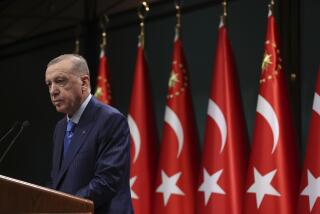Turkey Outraged Over Rome’s Stance
- Share via
ANKARA, Turkey — Tensions between NATO allies Turkey and Italy continued to escalate Sunday as Turkish Defense Minister Ismet Sezgin said that Italian companies will be barred from lucrative arms deals after Rome’s decision to free a Kurdish rebel leader held responsible for nearly 30,000 deaths.
“We shall protest to NATO about the Italian government,” said Sezgin, “and reevaluate our relations with Italy in all areas of the economy, and not just the defense industry.”
On Friday, an Italian court freed Abdullah Ocalan, leader of the outlawed separatist Kurdistan Workers Party, or PKK, whom the Turkish government sought to extradite and try on murder charges. But the court ordered Ocalan, who wants asylum in Italy, to remain in Rome in case Bonn seeks his extradition for his alleged involvement in the slayings of three rebel deserters in Germany.
Public anger in this predominantly Muslim nation has been steadily mounting ever since the Italian government rejected Turkey’s demands to hand over Ocalan on grounds that he would be denied a fair trial in Turkey. Italy’s constitution forbids capital punishment. Turkey’s most wanted man could face execution if found guilty here, even though the death penalty has not been carried out since 1984.
The barring of Italian companies from defense tenders is the first punitive measure taken by the Turkish government since Ocalan stepped off a plane from Moscow more than 10 days ago and was detained by Italian police.
At stake are several multibillion-dollar contracts, including a $3.5-billion tender to build 145 attack helicopters for which an Italian company was reportedly a leading contender.
Meanwhile, a nationwide boycott of Italian goods declared last week by major Turkish food and clothing retailers is rapidly spreading.
Relations between Rome and Ankara are likely to worsen as Italy’s center-left coalition government weighs Ocalan’s request for political asylum.
“The Italian government ignorantly opened its arms to the world’s bloodiest terrorist organization,” Turkish Prime Minister Mesut Yilmaz told a congress of his center-right Motherland Party on Saturday. “The whole world should know that if Italy persists in this disgrace, Turkey will not leave it unanswered.” He did not specify what further measures Ankara might take.
According to Alan Makovsky, a Turkey expert at the Washington Institute for Near East Policy, “Italy’s decision to extradite Ocalan or give him asylum may have a decisive impact on the Turkish-PKK conflict. Arrest could lead to the collapse of the already faltering armed struggle. Asylum might lead to Ocalan’s resurrection as a political leader with wide European recognition.”
The latter scenario is among Turkey’s worst nightmares. Ever since the PKK launched its bloody campaign for an independent Kurdish state in 1984, Turkey has argued that it is fighting against terrorists and has ignored Western appeals to resolve its Kurdish problem through political dialogue.
Over the past week, Turkey has detained more than 1,000 pro-Kurdish activists.
Meanwhile, thousands of angry demonstrators massed outside the Italian Embassy in this capital Sunday to protest the freeing of Ocalan. Many were waving huge Turkish flags and carrying pictures of loved ones lost in the military campaign against the PKK.
Yavuz Yucel, 23, a former army corporal whose left leg was blown off last year by a PKK land mine, said: “If need be, we should go to war against Italy. We’ve already lost 30,000 people; we’ll lose a few thousand more. But we will get that murderer back.”
More to Read
Sign up for Essential California
The most important California stories and recommendations in your inbox every morning.
You may occasionally receive promotional content from the Los Angeles Times.












